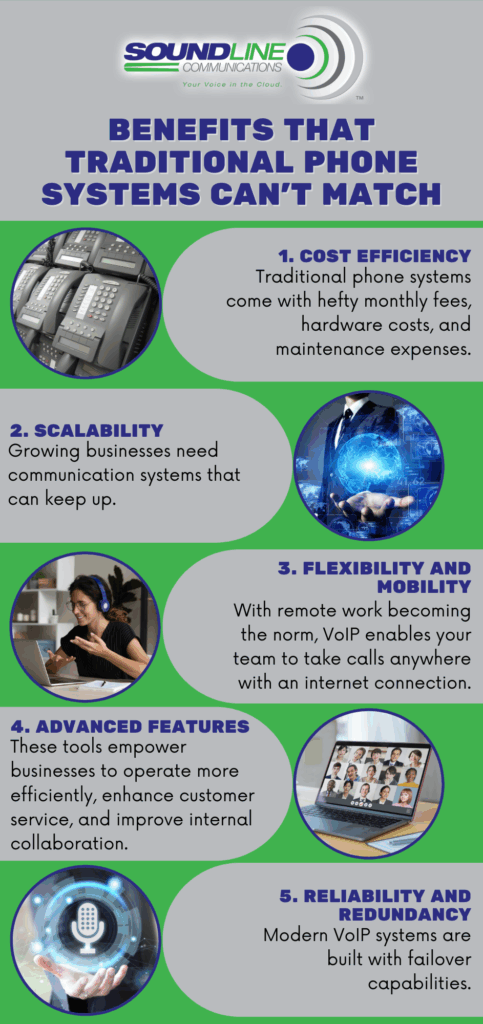What Is VoIP and How Does It Work for Business?

Welcome to the Future of Business Communication
Business communication is the backbone of success. Today, companies need reliability, flexibility, and efficiency—and that’s where VoIP technology comes in. VoIP (Voice over Internet Protocol) has revolutionized how businesses connect with customers, partners, and teams, offering crystal-clear calls, scalable options, and cost-effective solutions. But what exactly is VoIP, and why is it becoming the gold standard for modern business communication?
At Soundline Communications, we believe in providing the best service and customer support—with real people you can talk to. This guide will walk you through everything you need to know about VoIP, its benefits for businesses, and why now is the perfect time to make the switch.
What Is VoIP?
VoIP stands for Voice over Internet Protocol. Instead of transmitting voice calls through traditional copper telephone lines, VoIP uses your internet connection to make and receive calls. Essentially, it converts your voice into data packets that travel over the internet or a private network.
VoIP technology can be accessed through:
- Desk phones with VoIP capabilities
- Mobile apps
- Desktop applications
- Web-based interfaces
This means that whether you’re in the office, working remotely, or on the go, you can stay connected seamlessly.
According to a recent report by Statista, the number of VoIP business lines in the United States is projected to surpass 204 billion by 2025, emphasizing how widespread and trusted this technology has become [source: Statista].
Benefits Beyond Voice
VoIP is not limited to voice communication. Many platforms offer video calls, instant messaging, and file sharing, creating a unified communication environment that strengthens collaboration among teams.
How Does VoIP Work?
The mechanics of VoIP are both simple and ingenious:
- Voice Signal Conversion: When you speak into a VoIP device, your voice is transformed into digital data.
- Data Packet Transmission: These digital packets are sent over the internet or private network.
- Call Routing: A VoIP server routes the call to the intended recipient, who could be on another VoIP device or even a traditional landline.
- Signal Reconversion: The recipient’s device converts the digital data back into an audible voice.
This process happens almost instantaneously, delivering high-quality, clear voice communication.
Important Components of VoIP Infrastructure:
- IP Phones or Adapters: Specialized phones or adapters connect to your internet.
- VoIP Servers: Manage call routing and features like voicemail, call forwarding, and conferencing.
- Internet Connection: The quality of VoIP calls heavily depends on your internet bandwidth and speed.
- Session Border Controllers (SBCs): Devices that manage call security, quality, and regulatory compliance.
- Cloud PBX: A cloud-based private branch exchange system that manages internal and external call routing.
By utilizing these components, businesses can create a reliable, efficient communication network without the limitations of traditional systems.

Why VoIP Is a Game-Changer for Small and Medium Businesses (SMBs)
VoIP offers a variety of business benefits that traditional phone systems can’t match, especially for small and medium businesses (SMBs):
1. Cost Efficiency
Traditional phone systems come with hefty monthly fees, hardware costs, and maintenance expenses. VoIP dramatically reduces these costs by using your existing internet infrastructure. International and long-distance calls are often included or significantly cheaper. Additionally, businesses save on hardware upgrades and costly service technician visits.
2. Scalability
Growing businesses need communication systems that can keep up. With VoIP, you can add new users, locations, or devices without major hardware investments. It’s as simple as updating your service plan. Whether you’re opening a second office or adding remote employees, VoIP scales quickly and cost-effectively.
3. Flexibility and Mobility
With remote work becoming the norm, VoIP enables your team to take calls anywhere with an internet connection. Your office number can ring on a desk phone, mobile device, or computer simultaneously. VoIP ensures your business maintains a professional image even when employees are working remotely.
4. Advanced Features
VoIP solutions include powerful features like:
- Auto-attendants
- Call forwarding
- Voicemail to email
- Video conferencing
- Call recording
- Integration with CRM and business software
- Real-time call analytics
These tools empower businesses to operate more efficiently, enhance customer service, and improve internal collaboration.
5. Reliability and Redundancy
Modern VoIP systems are built with failover capabilities. If your internet goes down, calls can automatically route to mobile devices or backup numbers, ensuring you never miss an important call. Additionally, many VoIP providers offer 24/7 monitoring and proactive maintenance to avoid downtime.
Types of VoIP Solutions: Hosted vs. On-Premises
When considering VoIP for your business, it’s essential to understand the two main types of deployment options:
Hosted VoIP
Hosted VoIP (also called cloud VoIP) means your VoIP infrastructure is managed off-site by a service provider like Soundline Communications. Benefits include:
- Lower upfront costs
- Minimal maintenance requirements
- Easy scalability
- Built-in redundancy and disaster recovery
Hosted VoIP is ideal for businesses that want a hassle-free, scalable solution with minimal in-house IT support.
On-Premises VoIP
With on-premises VoIP, the company hosts the VoIP servers and equipment internally. Benefits include:
- Greater control over system configuration
- Potential cost savings over time for large businesses
- Customization of security measures
On-premises VoIP is suited for businesses with complex, specialized needs and the IT resources to manage and maintain their systems.
Choosing the right solution depends on your business size, growth plans, security requirements, and internal capabilities. Soundline Communications can help you evaluate and implement the best system for your organization.
Is VoIP Right for Your Business?
If you rely on consistent communication with clients, partners, and internal teams, VoIP could be the upgrade your business needs. Here are a few considerations to ensure VoIP is the right fit:
- Internet Speed: A reliable, high-speed internet connection is essential.
- Device Readiness: Evaluate if your current hardware is VoIP compatible or if upgrades are needed.
- Business Size: VoIP scales easily, whether you have 5 or 500 employees.
- Integration Needs: VoIP systems can integrate with CRM platforms, ticketing systems, and marketing software, enhancing productivity.
At Soundline Communications, we tailor VoIP solutions that fit your specific business needs. Our team—real people who are experts you can talk to—will walk you through every step, from setup to support.
How to Transition to VoIP with Soundline Communication
Transitioning to VoIP might sound complicated, but with Soundline Communications, it’s a smooth and supported process:
- Consultation: We assess your current setup, goals, and needs.
- Customized Plan: We develop a VoIP solution specific to your business.
- Implementation: We manage installation, port your numbers, and train your team.
- Ongoing Support: Our support team is always available with real, friendly experts ready to assist you.
Pro Tip: Choose a provider like Soundline Communications that offers comprehensive support, ensuring your system evolves alongside your business.
Conclusion: The Time for VoIP Is Now
VoIP is more than a trend—it’s the new standard in business communication. With its cost savings, flexibility, and powerful features, VoIP empowers businesses of all sizes to operate more efficiently, stay connected, and adapt to changing work environments.
Companies that adopt VoIP are better equipped to compete, grow, and serve their customers in a rapidly evolving digital landscape. By partnering with Soundline Communications, you gain access to the best service, best customer care, and real people who are dedicated to your success.
Don’t let outdated communication systems hold your business back. Future-proof your operations with VoIP today.
Ready to get started? Learn More about how we can customize a VoIP solution for your business today.
FAQs
What equipment do I need for a VoIP business phone system?
Most businesses need a reliable internet connection, VoIP-enabled phones, and a VoIP service provider. Soundline Communications can help you determine exactly what you need based on your unique requirements.
Can I keep my existing phone number with VoIP?
Yes, you can port your current phone numbers to your new VoIP system. Our team will ensure a seamless transition with no interruption to your business communications.
How secure is VoIP for business communication?
VoIP systems offer strong security protocols like encryption and authentication. With Soundline Communications, we implement best practices to keep your communications private and secure.
